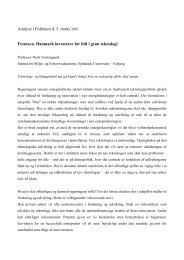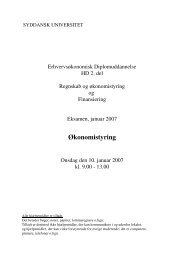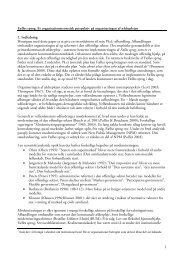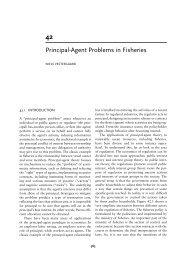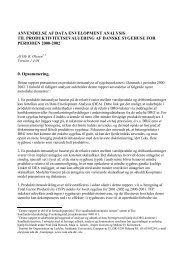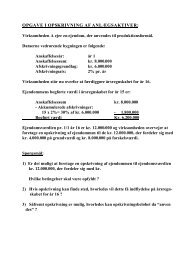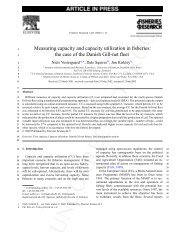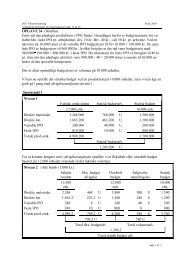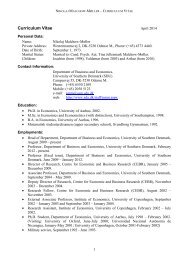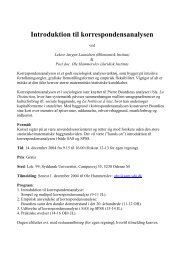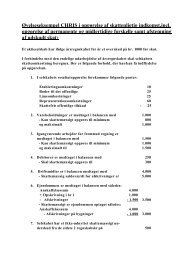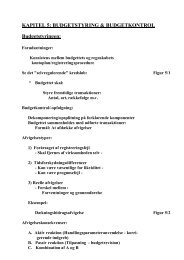Development of Parties and Party Systems in ... - lah@sam.sdu.dk
Development of Parties and Party Systems in ... - lah@sam.sdu.dk
Development of Parties and Party Systems in ... - lah@sam.sdu.dk
- No tags were found...
You also want an ePaper? Increase the reach of your titles
YUMPU automatically turns print PDFs into web optimized ePapers that Google loves.
In Hungary the national bank, the constitutional court <strong>and</strong> the ombudsman <strong>in</strong>stitution placedrestrictions on the law mak<strong>in</strong>g process (“fragmentated democracy”). In fact we were deal<strong>in</strong>g with atoo early <strong>and</strong> too sifistcated <strong>in</strong>stitutionalisation. In Russia <strong>and</strong> Ukra<strong>in</strong>e strong f<strong>in</strong>ancial oligarchs,network<strong>in</strong>g, clientura’s <strong>and</strong> other structures outside democratic control arrogated to themselves amenac<strong>in</strong>gly strong position, thus weaken<strong>in</strong>g the freedom <strong>of</strong> action <strong>of</strong> the political parties <strong>and</strong> thel<strong>in</strong>ks <strong>of</strong> parties to civil societies. To some extent those non democratic structures orig<strong>in</strong>ated <strong>in</strong> theold state socialist system.To obta<strong>in</strong> a mean<strong>in</strong>g for the populations <strong>in</strong>stitutions have to be strong enough to <strong>in</strong>ternalise thenorms necessary for the survival <strong>and</strong> futher consolidation 29 . For that to happen the <strong>in</strong>stitutions shallbe capable to adapt themselves to the political environment, shape the optimal congitive frames <strong>of</strong>references <strong>and</strong> make complex realities more simple for the citis<strong>in</strong>s. Only thereby the sufficientloyalty <strong>and</strong> legitimacy can be obta<strong>in</strong>ed. The new won democray can only be consolidated, if thedemocratically elected <strong>in</strong>stitutions are sufficiently strong to live up to their responsibilities <strong>and</strong>ensure rule <strong>of</strong> law. In other words, party organisations has to be considered as an important<strong>in</strong>terven<strong>in</strong>g variable. Neither political ideologies can be rooted <strong>in</strong> society without the sufficient<strong>in</strong>stitututionalisation 30 . However, the question has been raised, whether high <strong>in</strong>stitutionalizationnecessarily is the most appropriate <strong>in</strong> young democracies, subject to fast changes, <strong>in</strong> which mostimportant is ability <strong>of</strong> adaption <strong>and</strong> flexibility 31 . Opposite, weak <strong>in</strong>stitutionalization may foster antipartyattitudes. In the longer term, however, the parties have to promote more <strong>in</strong>stitutionalization,but <strong>in</strong>stitutionalisation is <strong>of</strong>ten more the result <strong>of</strong>, not the precondition for consolidation <strong>of</strong>democracy.The question has been raised, whether <strong>in</strong> the early stage political <strong>in</strong>stitutions constituted an<strong>in</strong>dependent variable <strong>and</strong> thus became decisive for the formation <strong>and</strong> the development <strong>of</strong> politicalparties, or <strong>in</strong>stitutions alternately can better be regarded as a mechanic reflection <strong>of</strong> the division <strong>of</strong>power between the parties <strong>and</strong> the most important cleavages <strong>in</strong> the societies concerned (Ware,1996:197). Inside the parties top-down constructions <strong>and</strong> centralisation <strong>of</strong> power around a smallgroup <strong>of</strong> persons has been observed. Under some circumstances the party structure has become“stratarchial”, <strong>in</strong> which case elements <strong>in</strong> the party organisation become more authonomous aim<strong>in</strong>gat the highest as possible freedom <strong>of</strong> action. That has mostly been seen <strong>in</strong>side party federations suchas AWS <strong>in</strong> Pol<strong>and</strong> <strong>and</strong> SDK <strong>in</strong> Slovakia characterized by dysfunctional decision mak<strong>in</strong>g structures<strong>and</strong> splits.As agued by Paul G. Lewis <strong>and</strong> Radzislawa Gortat also west-European parties have moved awayfrom maximation <strong>of</strong> the number <strong>of</strong> party members <strong>and</strong> high <strong>in</strong>stitutionalization towardspriotitisation <strong>of</strong> election success, i.e. maximation <strong>of</strong> votes 32 . In general the political parties morerem<strong>in</strong>ds us about Kirchheimers “catch-all, Panebianco’s “electoral- pr<strong>of</strong>essional” <strong>and</strong> Katz <strong>and</strong>Mairs “cartel parties” than about Duvergers mass parties (Szczerbiak, 2001:101). In l<strong>in</strong>e with thatDavid M. Olson argues that evidence from the first 10 years <strong>of</strong> transition shows that partyorganisations develops on the basis <strong>of</strong> small groups <strong>of</strong> activists <strong>and</strong> broadly formulated <strong>and</strong> vague29 See Claus Offe, “design<strong>in</strong>g Institutions for East European Transition”, <strong>in</strong> Jerzy Hausner, Bob Jessop <strong>and</strong> KlausNielsen (eds), 1995.30 Underl<strong>in</strong>ed e.g. by Giovanni Sartori, e.g. <strong>in</strong> the article “The Sociology <strong>of</strong> parties:A critical Review”, <strong>in</strong> Mair (ed),1990:169.31 That question has been rased e.g. by Radoslaw Markowski <strong>in</strong> “<strong>Party</strong> System Institutionalisation <strong>and</strong> DemocraticConsolidation: On Ideosyncracies <strong>in</strong> the Polish Case”, <strong>in</strong> Frenzel-Zagórska <strong>and</strong> Wasilewski, 2000:65-89.32 Paul G. Lewis <strong>and</strong> Radzislawa Gortat, Models <strong>of</strong> <strong>Party</strong> <strong>Development</strong> <strong>and</strong> Questions <strong>of</strong> State Dependence <strong>in</strong> Pol<strong>and</strong>”,<strong>Party</strong> Politics, Vol. 4, 1995:599-608.39



